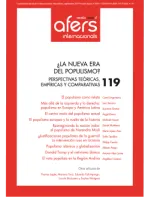Contemporary European populism and the return of history

This paper develops a relational analysis of populism. After placing the rise of contemporary European populism in the post-Cold War context, the static definition of populism as a “thin-centred” and restrictive ideology is exposed. A definition of populism as a process is used, in contrast with the tendency to apply static definitions. The figure of Pablo Iglesias is in this sense presented as an exemplary case that demonstrates the limitations of the use of these static definitions. The EU is also examined as a body that is spearheading the depoliticising processes that provoke the populist reaction – placing the focus on the “New Intergovernmentalism” to interpret the integration dilemmas – and the populist-technocratic and liberal-democratic dichotomies are addressed as historical endosymbioses. Finally, consideration is given to what should be done about the populist impasse.
Keywords: relational analysis, populism, ideology,democracy, liberalism, history, Europe
DOI: doi.org/10.24241/rcai.2018.119.2.85
>> The full text articles of this issue are available only in Spanish language